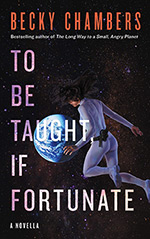
![]() Arifel
Arifel
1/2/2020
![]()
Science, aliens, and optimism in the face of an overwhelming universe.
It's hard to know when to pick up a high-concept Becky Chambers book, even one as short as this. On the one hand, To Be Taught, If Fortunate (named after a quote from UN Secretary General Kurt Waldheim's speech on the Golden Record sent with Voyager) is a novella that's being lauded for its big ideas: in particular, the way in which humans might adapt themselves for future interstellar space travel, and that suggests that it's a novella that will require careful attention to get the most out of it. On the other hand, Becky Chambers is an author most known for bringing radical comfort fiction to space, delivering a series in The Wayfarers that rejects ideas of necessary conflict or drama between diverse people while offering some great adventures and characterisation. To Be Taught, If Fortunate definitely delivers on both sides of that equation and requires engagement from its reader at the same time as it offers a fundamentally optimistic outlook in the face of the universe's many challenges.
To Be Taught, If Fortunate focuses on the voyage of four humans, sent to explore a set of four habitable worlds fifteen light-years from earth. The narrator, Ariadne, is the flight engineer for the Lawki 6 mission, part of an ecological survey sent to various exoplanets in the early 22nd century, joined by xenobiologist Elena, geologist Jack, and botanist Chikondi. The novella wastes no time in establishing the context in which Ari's mission has been launched: humans spent most of the 21st century confined to Earth as global problems increased, but never stopped sending probes to explore the wider solar system, and by the time of Ariadne's birth, the fact of life outside that on earth has been well established. The narrative, told in the form of a communication back to earth by Ari, details the crew's mission to each of the planets in the system: icy Aecor, life-rich Miribalis, ocean-covered Opera and extreme, tidally-locked Votum. Although she's not a scientist first, Ari is utterly devoted to the scientific value of the mission and eager to fold in both the technical and scientific elements of the mission to her narrative; it soon becomes clear that the reason she's doing that, and the underlying tension in the book, is the lack of communication from Earth for much of the mission, and the fear that their home planet has lost the ability or the will to respond to their work.
Because of all the science, the novella ends up being slow and almost meditative, and there's plenty of pages which are pure worldbuilding: from the scene-setting history of the first pages to a long discussion of molecular chirality and its implication for the origin of life at the end, there's a lot of descriptive content here, and it's not always obvious what purpose this information is serving. The blurb of the text makes a lot out of one particular technological feature, which are the genomic adaptations the crew undergo at each planet to adapt them to it, from general adaptations like increased radiation tolerance to world-specific changes such as increasing muscle mass on a high gravity world. This idea doesn't go anywhere direct, but it provides a compelling background, albeit one which never explores the ethical complexities behind it, particularly when it comes to the "baseline" corrections almost all of the characters receive - there's a lot of eugenic implications to unpack here which this narrative simply doesn't have the space for. That aside, there's clearly a lot of love and interest that's gone into the scientific elements, which are made narratively relevant by having a protagonist who is equally engaged. I'd suggest that the real highlight here is the weird and wonderful non-sentient life on each planet visited and the writing does a brilliant job of transferring the excitement of the crew with most of their discoveries - be it a garden of otherworldly vertebrates or a confirmation of microscopic life - onto the page and offering it to the reader.
http://www.nerds-feather.com/2019/08/microreview-book-to-be-taught-if.html